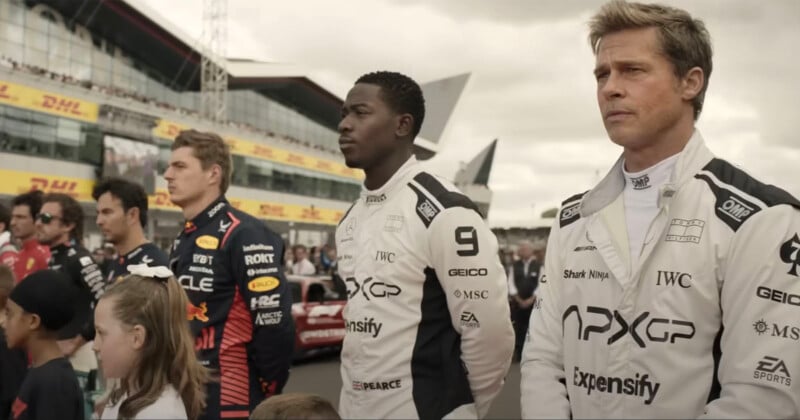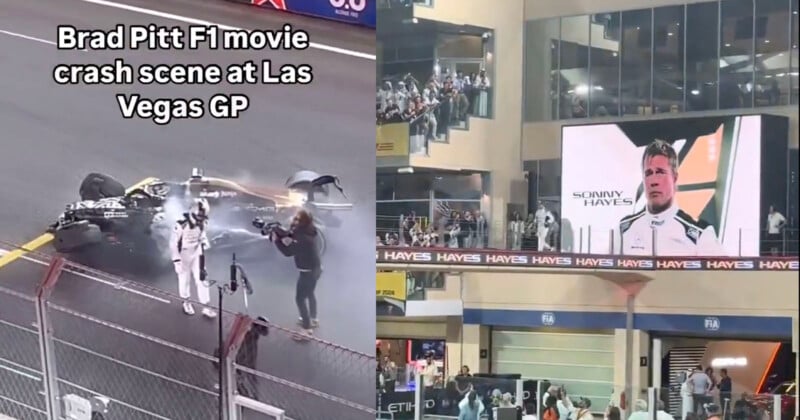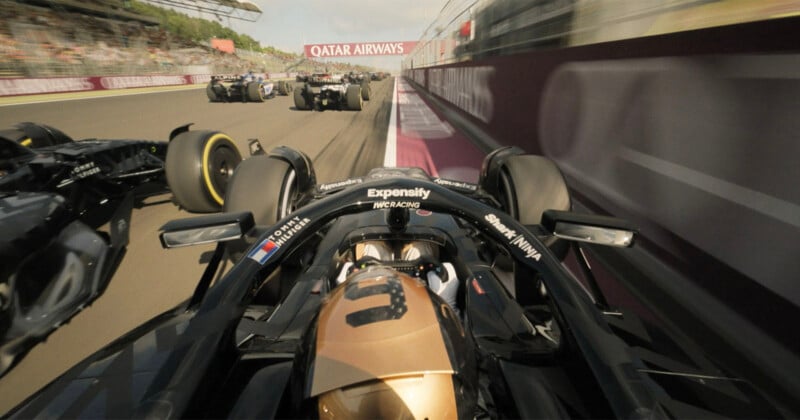Five Insane Filming Facts About the ‘F1’ Movie

The much-hyped F1 movie has been released in theaters this week and the production has been a bonanza of innovation and risk-taking. Here are five of the best stories from the making of F1.
The movie made by Jerry Bruckheimer and directed by Joseph Kosinski — the same team that made Top Gun: Maverick — follows the fictional APXGP outfit that Sonny Hayes, played by Brad Pitt, is a driver for. Rest assured there are no major spoilers in this article.
Apple Provided Movie Cameras
Capturing high-quality video from onboard a Formula 1 car is a difficult task given that any extra weight can seriously disrupt the performance of the vehicles.
To help meet this challenge, Apple’s engineering team designed a custom module that is the same dimension, shape, and weight as standard F1 broadcast cameras but is powered internally by iPhone hardware.
The module houses an iPhone camera sensor, an A-series chip (likely the A17 Pro), an iPhone battery, and a neutral density filter to control exposure. Though not officially confirmed, Wired reports that the specs match the 48-megapixel camera system used in the iPhone 15 Pro.
The footage was recorded using Apple’s ProRes codec in a log format, capturing flat, low-contrast visuals that allow for extensive post-production color grading. The module ran on a version of iOS with custom firmware tailored specifically to the needs of the filmmakers.
Shooting at Real F1 Races
The logistics of shooting this film were highly unusual as star Brad Pitt found himself lining up alongside real Formula 1 drivers. The shots in the film of Pitt standing alongside the likes of Lewis Hamilton and Max Verstappen were real. It meant that the crew had narrow time slots to shoot in.
“The logistics of it are unlike anything I’ve done before. We’re shooting at the actual Grands Prix, there are certain aspects of this film where we’re working in very, very tight windows, shooting on the track, between practice and qualifying sessions, in front of hundreds of thousands of people,” director Joseph Kosinski told Deadline.
“It’s like a pitstop. It really brings an intensity and everyone’s leaning forward in a way that maybe you wouldn’t on a normal shoot day on a soundstage, where you’ve got 10 hours to get it right.”

It meant that the public attending an F1 race could watch scenes being filmed. Pitt even appeared on the podium alongside drivers George Russell and Charles Leclerc at one of the races.
A Prototype Sony Camera Just for the F1 Movie
Similar to Apple, to help meet the challenges of filming motor racing action, Sony Electronics provided a prototype camera for the production. Kosinski says it was necessary to capture the feeling of being inside an F1 car.
Sony’s engineers adapted a Cinema Line FX6 to create a detachable “sensor-on-a-stick” which allowed it to fit around the body of the F1 car, according to Sony.
“We spent a lot of time getting the cars ready,” explains cinematographer Claudio Miranda who also worked on Top Gun: Maverick. “Sony really listens to us.”

“You have transmitters that are transmitting the picture back. We’ve got transmitters controlling the movement of the camera. I’m sitting at the base station with Claudio [Miranda], our cinematographer, looking at 16 screens,” explains Kosinski.
“I’ve got camera operators on the controls for the cameras and calling out camera moves like a live television show while they’re shooting.
“So much research and technology and development went into just being able to roll a frame of footage, in addition to the training for the actors and the logistics of shooting at a real race, so it was a lot of prep to be able to pull this off.”
The Actors Were Actually Racing
Unlike Top Gun: Maverick where only one actor, Tom Cruise, was flying airplanes. Both Pitt and his co-star Damson Idris were actually driving racing cars. While they weren’t real Formula 1 cars, they were the next best thing: Formula 2 cars.
Pitt and Idris had to train for months to learn how to pilot the cars properly. It was actually Mercedes F1 team principal Toto Wolff who came up with the idea of using a prototype car.
“We actually bought six F2 cars, real F2 race cars and worked with Mercedes AMG, the Formula 1 team and their engineers to build real race cars that could carry our camera equipment, recorders and transmitters for making this film,” Kosinski tells the F1 website.
“Every time you see Brad or Damson driving this movie, they’re driving on their own in one of these real race cars on a real F1 track. So that’s kind of how we approached the making of this film.”
The World’s First Haptic Movie Trailer
To help with the marketing of the movie, Apple created the first-ever haptic movie trailer to quite literally build a buzz.
When watching on an iPhone running iOS 18.4 or above, the iPhone buzzes along with the engine roar and clicks as the Formula 1 car is being set up. The trailer is only avialble to watch via the Apple TV app.
Update 7/2: An earlier version of this article stated that a prototype Sony Rialto system was used for F1 when actually it was a prototype Cinema Line FX6 camera. We apologize for the error.